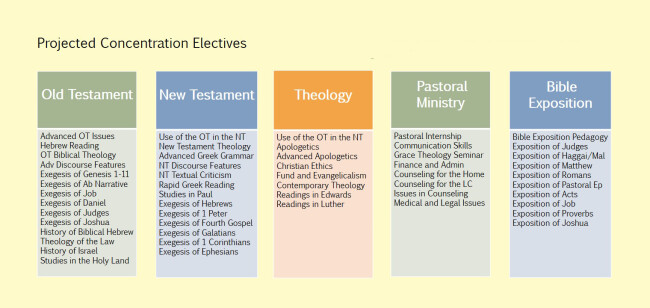Recently the faculty announced an extensive redesign of the Master of Divinity program. The revised program retains the robust framework of the classic Master of Divinity, emphasizing the biblical languages, Church History, Systematic Theology, and Practical Ministry. At the same time, the new program introduces initiatives to shorten the graduation timeframe, sharpen educational effectiveness, and adapt to student aptitudes and objectives. To meet these three objectives, the new MDiv program is built around the following features:
Advanced Standing Options: As a way to shorten graduation timeframes, the new MDiv program contains options for advanced standing. Previously, students with undergraduate preparation in Hebrew and Greek could obtain course waivers, or course substitutions, for the first year of Hebrew and Greek grammar. In the new MDiv program, incoming students who are able to demonstrate proficiency in Hebrew and Greek grammar can earn up to 12 credit hours of advanced standing.
Targeted Learning Outcomes: The MDiv program is now designed to sharpen educational effectiveness by focusing on a series of six learning outcomes. These six targets form the rationale for the curriculum as a whole, while informing the design and delivery of each course within the program. The program seeks to enable the graduating student to:
- demonstrate competency in the use and application of Biblical Greek and Hebrew;
- exegete the biblical text with sound methodological principles and practices;
- formulate and express theology in a manner that is exegetically sound, clearly expressed, historically informed, and methodologically coherent;
- engage the scope of church history and comprehend its significance for theology and ministry;
- communicate the Scriptures clearly and effectively in a variety of contexts;
- provide leadership in a variety of ministry contexts, as appropriate to roles defined in Scripture.
Specialized Areas of Concentration:The third objective for the new MDiv program is to create flexibility to meet individual student interests and objectives. To meet this goal, the 96 credit hours of the MDiv program are now ordered around 3 basic elements:
- A common core of 72 credit hours dedicated to the building of a solid foundation in ministry studies, exegesis, and theology.

- 15 credit hours of concentrated study in one of five areas: Old Testament, New Testament, Systematic Theology, Bible Exposition, or Pastoral Ministry.

- 9 credit hours of electives, enabling the student to pursue study in areas of secondary interest.


